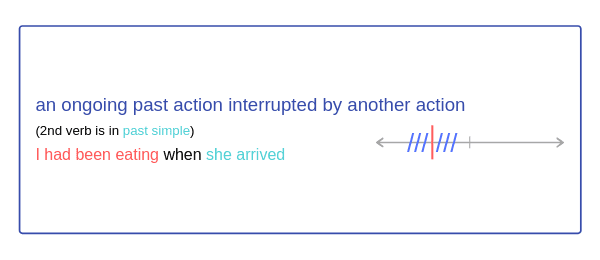Past Perfect Continuous Tense
timeline, form, uses

The Past Perfect Continuous tense (also known as the Past Perfect Progressive) is used to express that an action started in the past and continued in the past until something else happened in the past. Find Past Perfect Continuous timeline, form, uses below.
NOTE – the past perfect continuous is not dissimilar to the Past Perfect but expresses that the action continued for a longer period.
TO FORM THE PAST PERFECT CONTINUOUS
The Past Perfect Cpntinuous tense is formed using:
– auxiliary ‘had’ (from the Past Simple of ‘to have’)
– auxiliary ‘been’ (the Past Participle of ‘to be’)
– main verb in the Present Participle (verb +ing

affirmative: subject + had + been + main verb
negative: subject + had + not + been + main verb
question: had + subject + been + main verb
negative question: had + subject + not + been + main verb
Forms of the past perfect continuous for the verb to ask
affirmative
I had been asking
you had been asking
he/she/it had been asking
we had been asking
you had been asking
they had been asking
negative
I had not been asking
you had not been asking
he/she/it had not been asking
we had not been asking
you had not been asking
they had not been asking
questions
had I been asking?
had you been asking?
had he/she/it been asking?
had we been asking?
had you been asking?
had they been asking?
negative questions
had I not been asking?
had you not been asking?
had he/she/it not been asking?
had we not been asking?
had you not been asking?
had they not been asking?
PAST PERFECT CONTINUOUS TENSE USES
to express that an event started in the past and continued in the past
It had been raining all day
She had been studying all week
to express something started in the past and continued until something else happened in the past
Adam had been cleaning his car when it started to rain.
Peter had been teaching English for 3 years before he wrote a text book.
How long had you been waiting before the bus came?
to express cause and effect of actions taking place in the past
She had been putting on weight because of her unhealthy diet.
He had been climbing the ladder when he fell and sprained his ankle.
CONTRACTED AUXILIARY VERBS
Auxiliary verbs are often contracted, especially in spoken and informal written language.
| I had | I'd |
| you had | you'd |
| he/she/it had | he’d |
| we had | we'd |
| you had | you'd |
| they had | they'd |
| all forms had not | hadn’t |
More on contracted auxiliary verbs